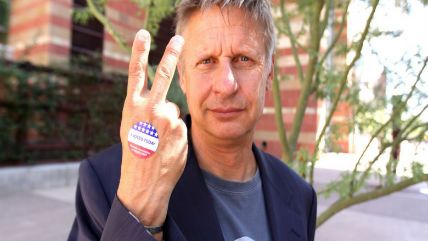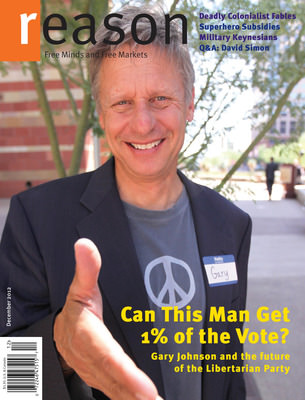Gary Johnson Avoids Typical Third-Party Fade; Best Polling Since Perot in '92
Also, 'most third-party candidates didn't lose that much support between late summer and Election Day,' notes FiveThirtyEight


A couple of weeks ago in this space I pushed back against assertions by FiveThirtyEight number-cruncher Harry Enten that Gary Johnson's polls have been "trending downwards," indicating that "voters may be moving away from third-party options." Well, today Enten is back with an interesting piece headlined "Gary Johnson Isn't Fading."
While noting what we have been warning you about here for years—third-party candidates typically see their crest of polling support halved by Election Day, according to Gallup—Enten explains that Johnson's numbers have so far not followed this pattern. In fact, the Libertarian may have already weathered the most difficult part of the calendar: "Most third-party candidates didn't lose that much support between late summer and Election Day," Enten writes. "Besides John Anderson in 1980, no candidate ended up finishing more than 3 percentage points below where they were polling in late August. The average drop-off is about 2 percentage points."
So how does Johnson's 9 percent stack up at this point in the campaign against other third-party candidates since World War II? According to numbers compiled by Enten here, fourth place, behind Ross Perot in 1992 (20 percent then, finished at 19), George Wallace in '68 (17/14), and Anderson in '80 (14/7). He's just a tick above Perot in '96 (8/8), behind which nobody comes close (sorry, Libertarians!). Because of his staying power, FiveThirtyEight has adjusted its predictions for Johnson's final vote upward, to 7.1 percent.
But what about the debates, I hear you ask. Well, while #TeamGov and its supporters are touting this new Qunnipiac poll showing 62 percent of Americans think the Libertarian should be in next month's televised showdown, that and a glass of water will get you a drink. As Enten notes, Johnson may not be fading, but he's also not particularly rising, either, and there's a whole lotta real estate between 9 and the required 15 percent. The L.P. ticket did reach a new high this week in the Quinnipiac poll (10 percent, up from 8 percent in June), and tied previous highs in polls by NBC News/Survey Monkey (11 percent), Rasmussen Reports (9 percent), and Reuters/Ipsos (7 percent), but at this advanced date, ties go to the loser.
Looking for a glimmer of hope? Here's one intriguing gap in the numerical record. Of the Commission on Presidential Debates' determinative Big Five polls, in which Johnson has been averaging 10 percent instead of 9, none of them have produced results in the last three weeks. Beginning any minute now, we should have a much clearer idea whether the Libertarians are rising in the polls that actually matter.


Show Comments (41)